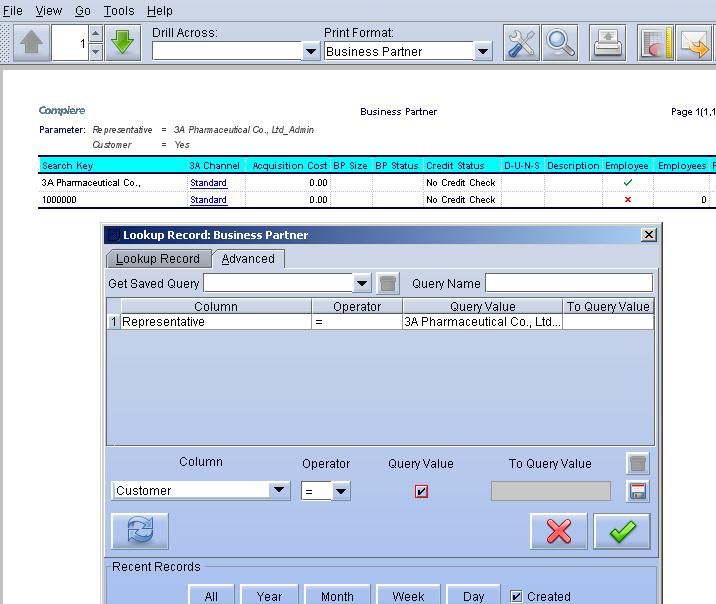Partner Relations
The customer manages their own customers, vendors and Sales Persons. Sales Persons have several hierarchical structures. Sales Target is defined on a nation wide and the target is specified to each hierarchical level.
Define Customer Program
The customer manages its customers into 4 different programs based on their transaction volume. The following are four different programs,
1. Develop a New Account ( DNA )
2. Strategic Push Program (SPP)
3. Push and Pull (PP)
4. Customer Loyalty Program (CLP)
Business Rules
- Customer Program will apply only to the GT Channel
UI /Report Layout

Define Customer Class
Customer segregates their customers based on several class levels. This comes as additional segregation in spite of the Customer Programs. This helps them to segment the customers between the Programs for the promotion and demotion levels. Class level also differs from region/sub-region/province.
UI /Report Layout

Program Threshold Mapping
Association between Program, Region, Sub-Region, Province, and Class levels are done here. Also, the threshold Qty will be defined for the promotion and demotion of the customers.
Business Rules
- Customer class levels will differ from program, region, sub-region and province
- No Overlapping of cartons for same region/sub-region/province/program and class
UI /Report Layout
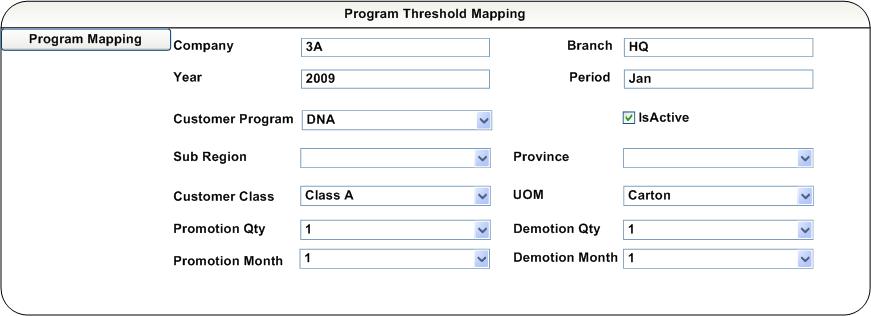
Define Outlet Type
AC Neilson Channel will be stored in the System as Outlet Type. This is used to match sell-out data with AC Neilson research data.
UI /Report Layout

Define Customer Channel
Customer manages several customer channels such as MT, GT, RT, EH and DA. In NGERP application this will be treated as a Group.
Expansions of the channels are as follows
MT – Modern Trade
GT – General Trade
Ethical
Indirect and
Internal
UI /Report Layout

Define Sub-Channel
Customer maintains several Sub-Channels under the channels. Some of the Sub-Channels are Super Market, Hyper Market, Hospital, Kindergarten, and Pharmacy.
UI /Report Layout

Manage Customer
The customer has a wide range of customers associated with them. When the new customers are created in the system, their identity (Shop Photo, Location) is attached in the system for future references. Customers are associated with the Channels, Outlets, Sales Man and Customer Programs.
Business Rules
- Customer Creation will be done only in HQ (in Master Database) by authorized personnel
- Customer, Salesmen relationship is always one to one
- Customer will be associated with one Program, Channel, Outlet, Price List, and Payment Term
- Credit Used should be accumulated based on open credit orders
- Customer can have one invoice address and many delivery addresses. One customer’s delivery address will belong to 1 route
- Customer code will be entered by the user. No need the system to suggest
- If the customer is reassigned to a new province or region, the customer code will remain the same
- Credit Limit approval should be controlled through role. Threshold should be given to update the credit limit
- Payment term discount should be allowed one day ahead from the configured days. But Invoice should print the actual payment term as in contract
- Only the Super User has the privilege to update the credit limit to be unlimited
- Credit Limit will be updated by Credit controller based on the request from Sales Man and approved by sales supervisors (but request and approved process will be managed outside the system)
- The customer Tax code should be stored. Tax code is Mandatory for DA & Modern Trade only. For others, it is optional
- Customers can be reactivated.
- Customer invoicing rule ( a) Invoice with delivery: Default rule to be applied., b) Invoice after acceptance of delivery: Applied for some Modern Trade only.
- Customer delivery schedule ( a) Fixed schedule: Delivery on a specific day. Override allowed.
b) Immediate schedule – Delivery as soon as possible. - Duplicate customers should be checked in customer creation. (This BR is not required as per customer comments)
Duplicate Check Criteria are (Customer Identity – this is manual, Customer Name, Customer Code, Customer Tax Code - Attach photo is used for the DNA Customers only.
Note: When a Customer transfers from one region to another, his same code (Previous Code) only is maintained in the new region also. So this Customer coding structure will not have any business value in it.
UI /Report Layout
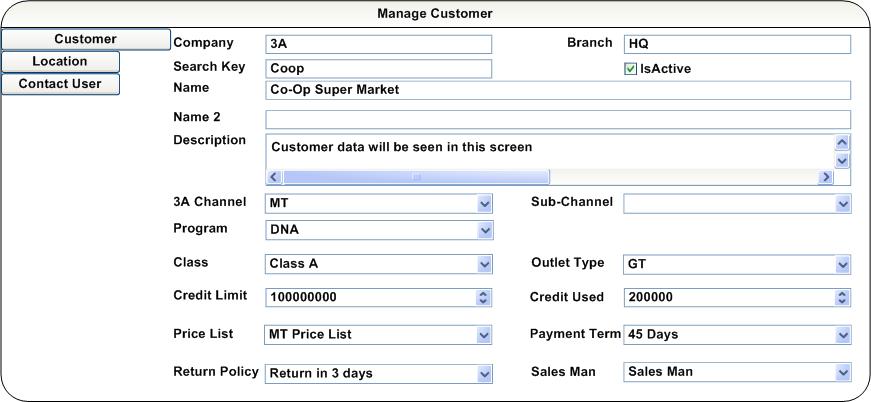
Location
Note: Change Labels – City to District, State to Province (List Box). Route should be added in this screen. Sales Region is mapped as ‘Sales Channel’.
Address Structure
UnitNumber -> Street Name -> Ward/Village/Quarter -> District/Town -> Province/City
Contact User

Define Summary Level Customers
Customers should have a provision to bind customers under them. This will be useful when viewing the reports. We can see the Parent Tree report and also can view the child customers belonging to the Parent.
Business Rules
Customer with no sales
- Customers belonging to this summary customer should be seen in the report under him
UI /Report Layout

Promote / Demote Customer
Customers will be promoted or demoted based on their sales volume in terms of carton. This can be overridden by the users. This should happen based on the Class levels set for the Customer Program. Promotion and demotion is redefined for 3 months.
Business Rules
- Should be promoted/demoted to any other level based on the Sales in terms of Carton (Volume) for configured month. This should be checked in terms of Region/Sub-Region/Province/Class mapping.
- Log should be done for the promotion / demotion process maintaining the history (Program, Class, User who imported, and Date).
- While Promoting / demoting the Customer, Sales Man will not be assigned automatically if he needs to be changed. User has to manually change the Sales Man if needed.
- Promotion/demotion will be determined by the Performance Master Report (Master Debit report where the Customers sell-out history will be shown) and or the Customer Promotion / Demotion Report.
- User will manually verify the Master Debit Report / Customer Promote/Demote and based on that they will promote or demote the customer.
UI /Report Layout
Approach
- Use the Import option to update the programs (Promote / Demote) of the customers
- Prepare the xls template to accommodate the new fields (Program, Class)
- Prepare Loader format to accommodate the new fields (Program, Class)
- Add additional fields in the temporary table to import the data
- Add new fields in the code to import the data into the customer table
Deactivate Customer
Customers can be if they have no transaction with the Customer. This can be overridden by the users. This process should happen 6 months once. The month is configurable.
Business Rules
- Should be deactivated upon Zero sales for a period of 6 Months (Manual Process)
- Even though the customer is deactivated, his outstanding debit / credit should be able to see
- Logs should be stored for the deactivation maintaining the history
- The system should alert if a customer (Trade Sale – PP, SPP, CLP) does not have any transactions for 90 days – This can be seen as the report in the Sales Report by Customers
- The system should alert if the customer (Trade System – DNA) does not have any transactions for 30, 60, 90 Days – This will be seen as a report in the ‘Sales Report by Customers’
- The system should not allow the deactivated customers in any Transactions (Sales Order, Delivery, Invoice), except for payments
UI /Report Layout
- N/A – User can manually deactivate the customer in the ‘Customer’ screen by viewing the ‘Customer with No Sales’ Report
Attach Photograph
The customer has a policy that while creating a new customer, his shop or other landmarks should be captured in a photo and it should be attached in the Customer creation screen for the identity.
Business Rules
- Photo of the shop and / or the landmarks should be attached
- Size of allowing the Photo attachment is (800 X 600 pixels, 72dpi, <100 KB in size)
UI /Report Layout
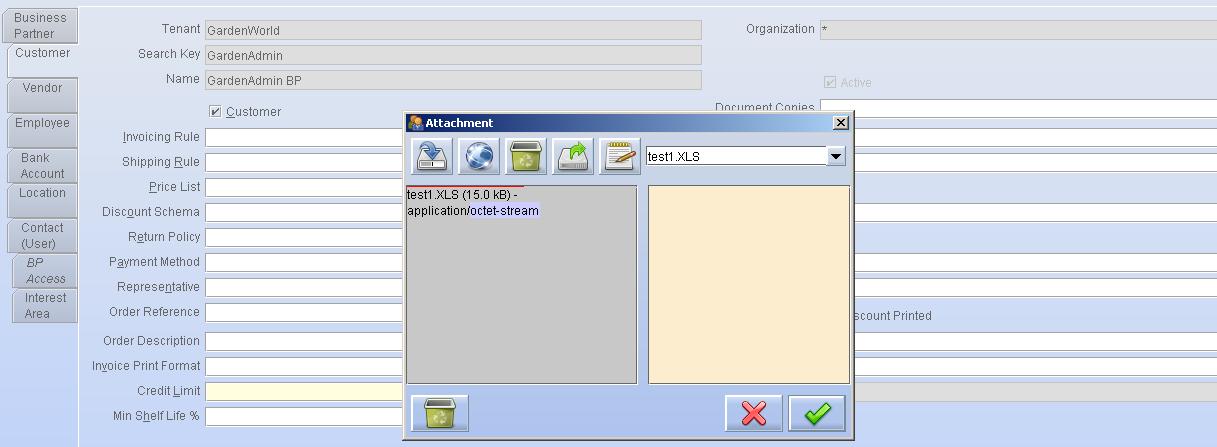
Manage Vendor
The customer has only one primary vendor Abbott for their trade purchase. For other non-trade, the purchase will be registered against standard vendors. However, the system should allow capturing the vendor details as they required for a large amount of purchase.
Business Rules
- Set up one vendor master (tax code of each vendor to be indicated in invoice screen) but no price list to record VAT in – a)No Price List, b) No Tax Code. Tax Code is entered in invoice screen
- Set up non-trade vendor master for purchases that require individual tracking – a)No Price List, b)Tax Code can be set up
- Set up trade vendor master (Purchase Order) for purchasing SKU from Abbott – a)Purchase Price List, b) Tax Code Not applicable for representation office
UI /Report Layout

Define Role Levels
There are many role levels defined in Customer from RSM to Sales Man. Role Levels are like RSM1, RSM2…, ASM1, ASM2,…, USM1,USM2,…,SS1,SS2,…, SM1,SM2,….
UI /Report Layout

Define Hierarchy Mapping
The customer has several hierarchies maintained from the RSM to the Sales Man. Hierarchy is as follows – Sales Director RSM ASM USM SS SM. Each hierarchy is defined based on geography.
Business Rules
- Role with the hierarchy will be mapped to the Sales Man
- This will be done for monthly
Sample Data
| Hierarchy Mapping | |
| RSM1 | Arul |
| RSM2 | Arshath |
| ASM1 | KK |
| ASM2 | Murli |
| USM1 | Kannan |
UI /Report Layout

Define Sales Man Hierarchy
Sales Man Hierarchy is defined with the target qty per SKU. Each Role level is mapped to the immediate reporting authority and the target qty is defined per SKU. It should be mapped against a Trade System or Trade Sales.
Business Rules
- Hierarchical levels will be mapped to immediate reporting authority with the target quantity and the SKU
- Trade Sales or Trade System to be specified
- One Role level can be associated with multiple top-level reporting authority
- The system will not do any validation as the quantity is defined from bottom to top. It will only store (import) the data. Any validations will be handled outside the system.
Sample Data
Sales Man Hierarchy
| Year | Month | Role | Reporting Hierarchy | Target Qty | SKU |
| Year | Month | Role | Reporting Hierarchy | Target Qty | SKU |
| 2009 | Jan | RSM1 | Sales Director | 50000 | Similac 400g |
| 2009 | Jan | RSM2 | Sales Director | 50000 | Similac 400g |
| 2009 | Jan | ASM1 | RSM1 | Similac 400g | |
| 2009 | Jan | ASM2 | RSM1 | Similac 400g | |
| 2009 | Jan | ASM3 | RSM1 | Similac 400g | |
| 2009 | Jan | USM1 | ASM1 | Similac 400g | |
| 2009 | Jan | USM2 | ASM1 | Similac 400g | |
| 2009 | Jan | USM3 | ASM1 | Similac 400g | |
| 2009 | Jan | SS1 | USM1 | Similac 400g | |
| 2009 | Jan | SS2 | USM1 | Similac 400g | |
| 2009 | Jan | SM1 | SS1 | Similac 400g | |
| 2009 | Jan | SM2 | SS1 | Similac 400g | |
| 2009 | Jan | ASM1 | RSM2 | Similac 400g | |
| 2009 | Jan | ASM2 | RSM2 | Similac 400g | |
| 2009 | Jan | USM1 | ASM2 | Similac 400g | |
| 2009 | Jan | USM2 | ASM2 | Similac 400g | |
| 2009 | Jan | SS1 | USM2 | Similac 400g | |
| 2009 | Jan | SS2 | USM2 | Similac 400g | |
| 2009 | Jan | SM1 | SS1 | Similac 400g | |
| 2009 | Jan | SM2 | SS2 | Similac 400g |
UI /Report Layout
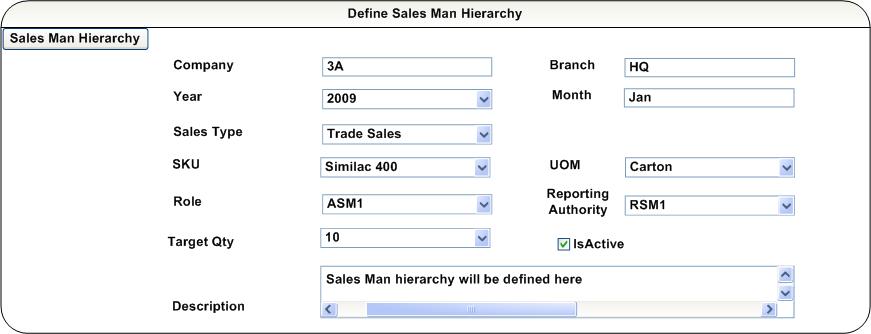
Manage Salesperson
To manage the salesperson, this avoids duplication and increases the accuracy and effectiveness in salesman management. The sell-out data can be sliced-and-diced by region, province/district, sell-out date, and salesman/agency.
Business Rules
- One salesperson will have one unique code
- Salespersons are defined hierarchically in the system
- Sales Man Type (Trade Sales / Trade System) to be defined
- Ability to view the aggregation and drill-down of sales data and sales target from top to bottom of the hierarchy tree
- Ability to define the sales target skewing of each salesman i.e., monthly sales target can be broken down into 4 weeks by the percentage of sales
- Sales Man code will be entered by the user. No need the system to suggest this
- Salesman duplication check criteria : (Name, Date of birth, ID Card number)
UI /Report Layout
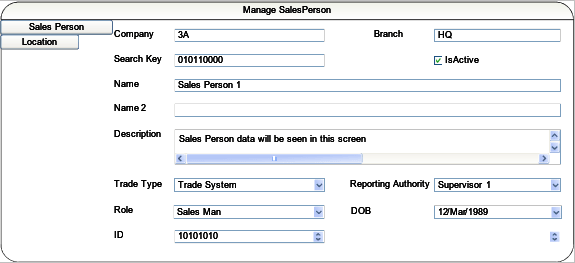
Location
Note: Change Labels – City to District, State to Province (List Box).

Deactivate Salesman
When a salesman resigns or sales supervisor decides to deactivate salesman based on his sales, the salesman inactivation will be sent to customer care. All customers belonging to the salesman are transferred to new salesmen before inactivating salesman.
Business Rules
- All customers belonging to a salesman should be transferred to a new salesman
- The system should disallow the sales order using the inactive salesman
- The system should continue to monitor outstanding debit and credit of the inactive salesman
- The log should be maintained of the inactivation history
UI /Report Layout
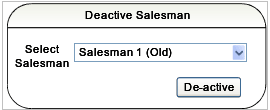
Transfer Customers
Customers of one salesman are transferred to another salesman due to the resignation of old salesmen or salesmen reassigned to a new region/province/district.
Business Rules
- The transfer should only affect servicing salesmen in the customer master. It should not change the transaction salesman in historical sales order
- Date and modification will be recorded in the salesman profile
- Ability to add new customers for the new salesman during this process
UI /Report Layout
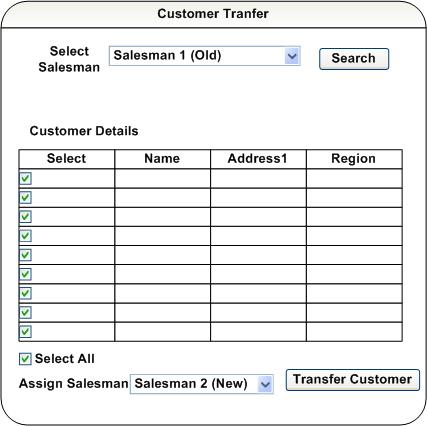
Reporting
The customer manages their customer, vendor, and salespersons using various reports. This reporting unit covers all the reports used for the operation layer to manage partners in the system.
Note: Employee reports not required in this release.
Customer Promotion / Demotion Report (BI)
This report provides details about the customers who are to be promoted or demoted based on the selected month.
Users can choose the Customers and the Criteria (Promotion / Demotion / Both) to see the report for the selected month. Month, Criteria is mandatory. If no customer is selected, then the report will show the promotion/demotion level for all the customers. The report will be generated in the tabular format.
Process Flow
N/A
Business Rules
- The display fields should be configurable
- Ability to print the report
- Ability to export the report in CSV format
- Start Month will be provided as the parameter
UI /Report Layout
Qty sold in Cartons – sample calculation for Customer X
SKU A (12 tins/Carton): 25 tins 2.0833 ctn
SKU B (24 tins/Carton): 18 tins 0.75 ctn
SKU C(6 tins/Carton): 28 tins 4.6667 ctn
Total Cartons sold = 7.5 ctn
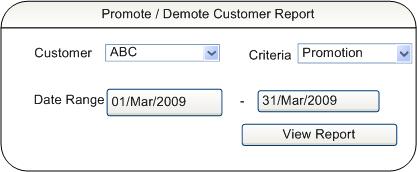

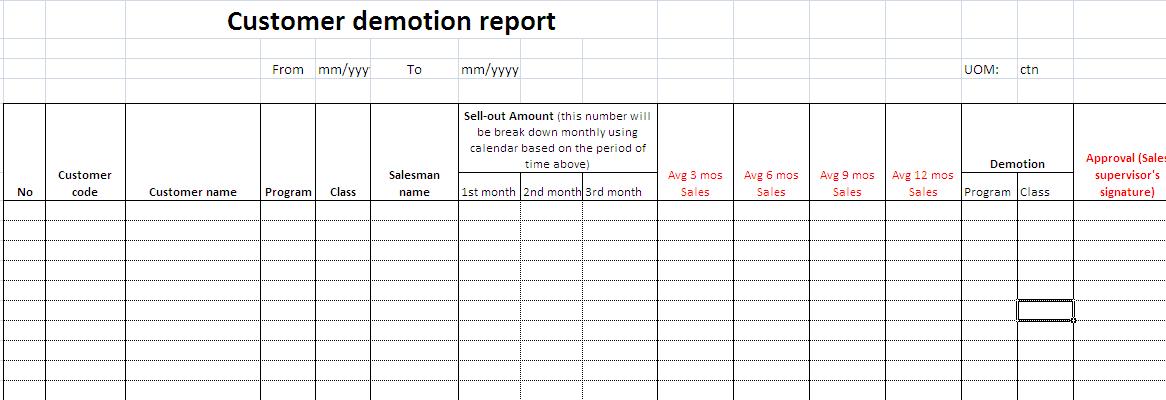
Customer with no sales
This report provides the detail of customer information having no sales for given months. The default value of the month parameter will be 3. The report will be generated in the tabular format.
Process Flow
N/A
Business Rules
- The display fields should be configurable
- Ability to print the report
- Ability to export the report in csv format
UI /Report Layout

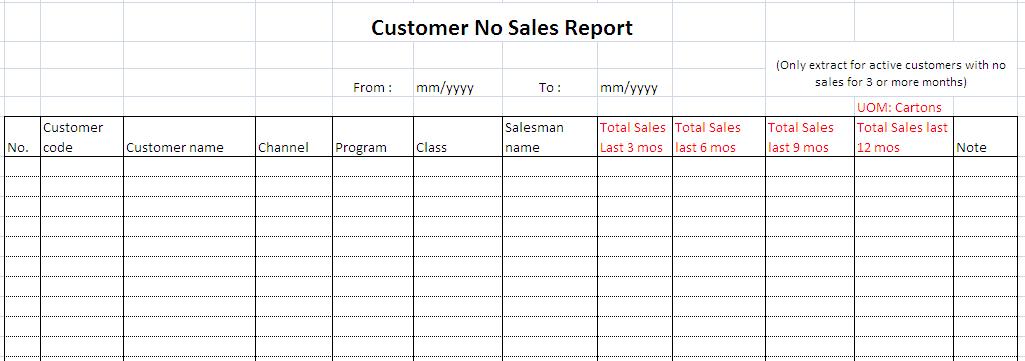
Note: Report will list each month sales of 3 months
Generate Salesman list
Salesman list provides the detail salesman information search by code, name, and region.
Users can search either by code, name, and region. If no parameters are selected system will provide an entire list of a salesman. Reports will be displayed in the tabular format.
Process Flow
N/A
Business Rules
- The display fields should be configurable
- Ability to print the report
- Ability to export the report in csv format
UI /Report Layout
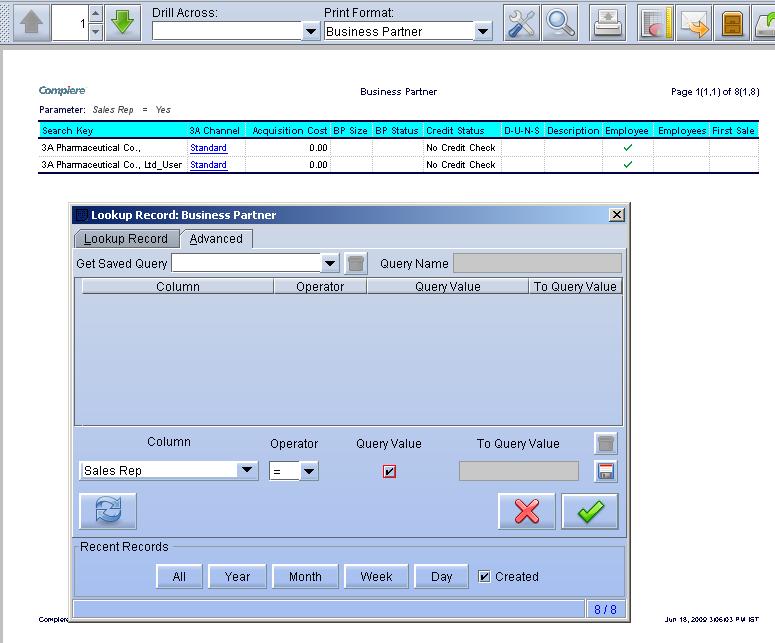
Generate Customer list by the salesman
The customer list provides the detail of customer information belonging to the salesman search by code, name, and zone. Users can search either by code range, name, and zone. If no parameters are selected system will provide an entire list of customers. Reports will be displayed in the tabular format.
Business Rules
- The display fields should be configurable
- Ability to print the report
- Ability to export the report in CSV format
UI /Report Layout
